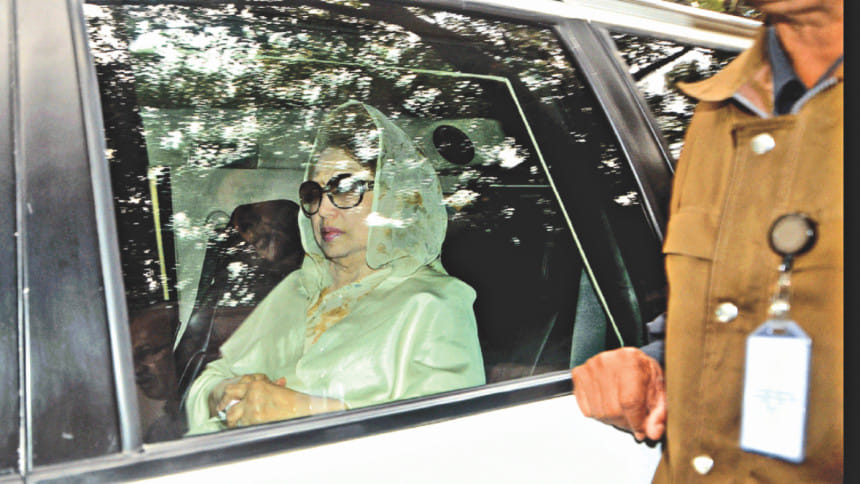AFTERMATH OF KHALEDA et al VERDICT Will Khaleda be disqualified for the next election?

After the Zia Orphanage Trust decision, many see the end of eventful political career of ex-prime minister Khaleda Zia where she has been sentenced with a five years imprisonment along with fines. The Representation of the Peoples Order, 1972 (RPO) as amended in 2009 in its section 12(3) proffers Khaleda Zia with a disqualification to submit her candidature in the impending national election scheduled to be held at the end of the year. Article 66(2)(d) of the Bangladesh Constitution also sets a ground of disqualification for her to become a parliament member since the act of embezzlement of trust clearly comes within the purview of 'moral turpitude' as espoused in Monoranjan Mukherjee v Election Commission (41 DLR 484).
However, the moot question is whether the conviction by the special court can be said to be the 'final conviction' and attracts the above mentioned provisions since the appeal, review stages are yet to happen. The decisions of the High Court Division are varied in this respect. It was held in Serajul Huq Chowdhury v Nur Ahmed Company (19 DLR 766) that the disqualification will operate only after exhaustion of the appeal option. However, in H M Ershad v Abdul Muktadir Chowdhury (53 DLR 569) a division bench was divided in their opinions in holding a conviction as 'final conviction' to attract Section 12(3) of RPO and Article 66(2)(d) of the Constitution. Relying on Serajul Huq judgment, Justice Joynal Abedin held that the criminal sentence of moral turpitude needs to be the 'final sentence' for disqualifying one person. On the contrary, Justice ABM Khairul Haque declined to hold the final sentence as such since he feared that convicted person will leave no stone unturned to delay the appeal proceedings, thereby frustrating the proceeding. Justice Haque refused to allow a person of proven misconduct and questionable reputation to be in the position of an honourable parliament member.
On the face of such divided standings of the High Court Division, the nation will eagerly wait to hear from the appellate division as to who is expected not only to fix this important legal issue but also to determine the fate of the political career of Khaleda Zia.
It is obvious that the apex court will have hard time deciding this issue while scrutinising a number of pressing factors. If the court decides that any kind of conviction of more than two years for moral turpitude will disqualify any person from becoming a member of parliament, it will have to satisfy itself by answering few relevant questions.
Firstly, what will be the consequence, if after disqualification of any member of the parliament on the ground of criminal conviction, any by-election is arranged for the vacant post of such disqualified MP and a new MP is elected? In that case if any MP gets acquittal in the appeal stage, who will be the member of the parliament from that particular constituency? The question came in HM Ershad case and Barrister Tania Amir answered to the question by referring Mahbub Uddin Ahmed v Election Commissioner (50 DLR 417) that the candidates of the said by-election are supposed to contemplate the consequence that they can be dethroned at a later stage if the disqualified MP purges from the stigma. Justice Abedin did not buy this argument of the learned lawyer since Article 123(4) does not confer any conditional membership to any member of the parliament. Consequently, the issue is yet to be settled.
Secondly, the apex court will have to decide whether the word 'conviction' can be interpreted as 'final conviction' or if the same will be beyond the power of the court to 'add anything' to the very words of the constitution. Since there remains a number of ways of interpreting the statutes, the court will be at liberty to construe it. If the court applies mischief rule of legal interpretation, it will not accept the word 'final conviction' since that will hamper the very purpose of the law that had been enacted to outweigh a mischief. On the other hand, if the court interprets it applying the Golden rule, the court cannot but take account of Article 123(4) of the Constitution which provides for an unconditional membership to an MP who can be elected in a subsequent by-poll. It will be very hard for the court to ensure the constitutional rights of two elected MPs if it declares that the conviction without a finality can disqualify any person.
Thirdly, the court is supposed to take all the probable consequences into its account, if it vouches for the finality of conviction. That will certainly allow the convicted persons to delay the appeal proceeding in every possible ways. But, since the philosophy of appeal, review echoes the principles of 'beyond reasonable doubt', a finality of judgment can be held to be desirable by the apex court also.
It is, therefore, never an easy task for the court to decide whether it will take the 'conviction without finality' or 'conviction with finality' to construe Article 66 (2)(d) of Bangladesh Constitution and Section 12(3) of the RPO. Since it has obvious repercussions to be followed by under both models and the decision will not only relate to the fate of Khaleda Zia rather will bear immense significance in the constitutional jurisprudence of Bangladesh, it is expected that the appellate division will play its pivotal role by setting up a sensible benchmark after meticulous scrutiny of every possible legal issue.
The writer is a Lecturer in Law, Daffodil International University.

 For all latest news, follow The Daily Star's Google News channel.
For all latest news, follow The Daily Star's Google News channel. 



Comments